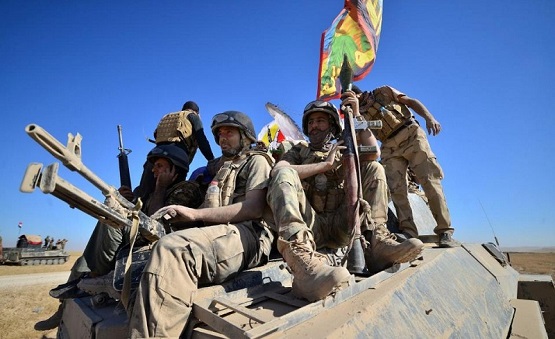Iraqi army Forces backed by Popular Mobilization Forces have almost liberated the northwest city of Tal Afar from ISIS terrorist group, the Iraqi army said in a statement on Sunday.
Fighting was ongoing in al-'Ayadiya, a small area just outside the city. Iraqi forces were waiting to retake the city's surrounding areas to declare a complete victory.
A predominantly Turkmen district with a population of around 200,000, Tal Afar was overrun by ISIS terrorists in 2014. Tal Afar Liberation Operation began on 19 August.
Tal Afar is the main remaining ISIS stronghold in northern Iraq, after the Iraqi forces' success to liberate the country's second largest city Mosul in July.
Why is retaking Tal Afar Significant?
The terrorist group was utilizing the city's highway that links the north to the Syrian territories as a major supply line, making Tal Afar one of the major areas facilitating ISIS logistics. Additionally, the ethnic diversity of the city's population makes it next focal point, after Mosul, of an array of regional and international actors.
Reportedly, some 2,000 ISIS terrorists were in Tal Afar, and fall of city dealt a painful blow to the terrorist group by raising its casualties.
Moreover, Tal Afar is located in a triangular border area whose flanks link Iraq to Turkey and Syria. Tal Afar is only 60 kilometers away from the Turkish and Syrian borders. In fact, a major part of Tal Afar importance comes from its being a linking ring between Iraq, Syria, and Turkey.
Tal Afar showed resistance to American invasion in 2003. The city fell in 2005 when nearly 5,000 American troops were deployed for a large-scale offensive. This has been the largest operation in the city to date. Tal Afar residents at that time said that the US forces used internationally-banned weapons during their push to finally manage to seize the city in September 22.
The city has been a lifeline for terrorists between Syria and Iraq. ISIS leader Abu Bakr al-Baghdadi entrusted rule of the city to Azerbaijani, Uzbek, and other Caucasian terrorist commanders who nearly 300 of them crossed the Turkish borders into Iraqi territories along with their families.
ISIS rewarded its fighters with seized homes in Tal Afar, and turned many houses and government buildings into security and operation headquarters as well as weapons and food storehouses.
Farming and animal husbandry, as before, have been ongoing activities in the city, providing part of Tal Afar and other ISIS-held regions' food needs.
Tal Afar significance for Turkey
Tal Afar is not only of importance for ISIS. Turkey set eyes on the city, too. The Turkish leaders felt threats as Turkmens held close relations with the Kurdistan Workers' Party (PKK), the archenemy of Ankara and blacklisted as a terrorist group by Turkey. PKK is active in vast swaths of Nineveh, including Sinjar Mountains. Another source of Turkish worry stems from the Turkmens' bonds with the Shiites, including the Popular Mobilization Forces (PMF), formed in opposition to ISIS.
Driven by own interests and also European pressures to stop influx of refugees from Iraq, Turkey is expected to closely watch the Tal Afar liberation process to which the PMF are also a party. Analysts warn that it may set roadblocks ahead of the operation, adding that Ankara's earlier military dispatch to northern Iraq and insistence on participation in Mosul operation might serve a desire of the Turkish leaders to influence the liberation campaign in such regions as Tal Afar.
LINK: https://www.ansarpress.com/english/8282
TAGS:































 online news tv
online news tv




